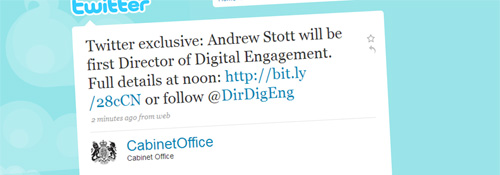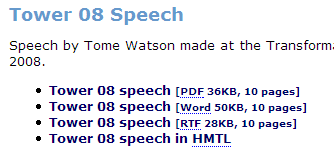I usually let the Taxpayers’ Alliance stuff wash over me. No matter how valid their points often are, it’s getting to the stage where every news story about any government expenditure has to feature an angry quote from them. Maybe journalists really are using that online TPA Quote Generator.
Then today, in the widespread but entirely inaccurate press coverage of a ‘Twittercrat on £118,000pa’, I spot a quote from TPA’s political director Susie Squire: ‘Taxpayers don’t want more Web2.0. They want an end to wasteful spending.’ Oh really? OK…
I was interested to find out more about TPA’s view of ‘Web2.0’… so I visited their website. Or specifically, their Typepad-hosted blog. How very ‘Web2.0’ of them. I wonder do they know about the various government websites which have also used Typepad for its cheap hosting, instant availability and high degree of configurability. I haven’t heard them praising it, so maybe not.
Anyway, a ‘Non-job of the week’ post makes a passing reference to the Cabinet Office vacancy, but concentrates on a local council recruiting a new press officer – which, apparently, is a bad thing. Anyway, as the article reaches its conclusion, author Tim Aker writes:
However, another communications officer at the council, taking scarce funds from the frontline, isn’t the answer. The answer is to have councillors do more than canvass at election time. Were we to have a more open political system … then maybe the people would trust politicians more. But as usual, instead of accepting the blindingly obvious solution of cutting back on their profligacy and engaging more with their constituents, the council opts for the norm and throws money at a problem. Sigh.
So the TPA wants more openness in government and politics. More direct engagement between elected representatives and the public. But it doesn’t want ‘Web2.0’ – the use of interactive technology, most of it ‘open source’ (and hence free), to promote direct engagement.
Here’s the thing. Done well, ‘more Web2.0’ has great potential to meet precisely the objective set by the TPA, namely bringing an end to wasteful spending. (And I like to think Puffbox is doing its bit in that regard.) How precisely do you ensure it is ‘done well’? You get someone in who knows what they’re doing. Someone with external experience, and internal seniority. And if you can get them into the one department specifically charged with improving government generally, so much the better.
Do you see where I’m going here, TPA? Sigh indeed.
PS Full marks to the Cabinet Office for their online rebuttal of the pathetic media coverage. It reads like a blog post, but it’s in the press release section of their website. I particularly love the line about @downingstreet being ‘followed by more than 1.2 million people, more than the official White House Twitter and considerably more than the daily circulation on most national newspapers.’

 Just announced by the Cabinet Office: Cabinet Office man Andrew Stott, Deputy Government CIO and chair of the
Just announced by the Cabinet Office: Cabinet Office man Andrew Stott, Deputy Government CIO and chair of the 